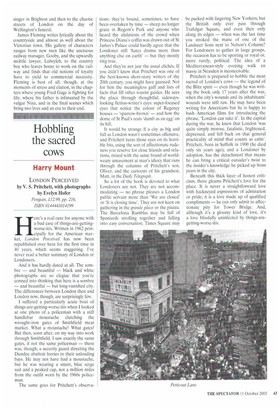Hobbling the sacred cows
Harry Mount
LONDON PERCEIVED by V. S. Pritchett, with photographs by Evelyn Hofer Penguin, £12.99, pp. 216, ISBN 0144441014199 Here's a real cure for anyone with a bad case of things-are-gettingworse-itis. Written in 1962 principally for the American market, London Perceived has now been republished over here for the first time in 40 years, which seems staggering. I've never read a better summary of London or Londoners.
And it has hardly dated at all. The sombre — and beautiful — black and white photographs are so elegiac that you're conned into thinking that here is a sombre — and beautiful — but long-vanished city. The differences between London then and London now, though, are surprisingly few.
I suffered a particularly acute bout of things-are-getting-worse-itis when I looked at one photo of a policeman with a stiff handlebar moustache clutching the wrought-iron gates of Smithfield meat market. What a moustache! What gates! But then, soon after, on my way into work through Smithfield, I saw exactly the same gates, if not the same policeman — there was, though, a security guard directing the Dundee abattoir lorries to their unloading bays. He may not have had a moustache, but he was wearing a smart, blue serge suit and a peaked cap, not a million miles from the outfit worn by the 1960s policeman.
The same goes for Pritchett's observa
tions: they're bound, sometimes, to have been overtaken by time — sheep no longer graze in Regent's Park and anyone who heard the ululations of the crowd when Princess Diana's coffin was drawn out of St James's Palace could hardly agree that the Londoner still 'hates drama more than anything else on earth' — but they mostly ring true.
And they're not just the usual clichés. If you didn't know that Pritchett was one of the best-known short-story writers of the 20th century, you might have guessed. Not for him the meaningless guff and lists of facts that fill other tourist guides. He sees the place through thoughtful, sidewayslooking fiction-writer's eyes: super-focused eyes that notice the colour of Regency houses — `sparrow-brown' — and how the dome of St Paul's rests 'dumb as an egg' on its hill.
It would be strange if a city as big and full as London wasn't sometimes offensive, and Pritchett turns those eyes on its horrible bits, using the sort of affectionate rudeness you reserve for close friends and relations, mixed with the same brand of worldweary amusement at man's idiocy that runs through the columns of Pritchett's son, Oliver, and the cartoons of his grandson, Matt, in the Daily Telegraph.
So a lot of the book is devoted to what Londoners are not, They are not accommodating — no phrase pleases a London public servant more than We are closed' or 'It is closing time'. They are not keen on gathering in the grande place or the piazza. The Barcelona Ramblas may be full of Spaniards strolling together and falling into easy conversation: Times Square may be packed with lingering New Yorkers; but the British only ever pass through Trafalgar Square, and even then only along its edges — when was the last time you stroked the mane of one of the Landseer lions next to Nelson's Column? For Londoners to gather in large groups, the occasion has to be sporting or royal or, more rarely, political. The idea of a Mediterranean-style evening walk en masse in Neasden is inconceivable, Pritchett is prepared to hobble the most sacred of London's cows — the legend of the Blitz spirit — even though he was writing the book only 17 years after the war, when the city's wounds and its inhabitants' wounds were still raw. He may have been writing for Americans but he is happy to bash American films for introducing the phrase, 'London can take it'. In the capital during the war, he knew that London 'was quite simply morose, fatalistic, frightened, depressed, and fell back on that general practicality of mind that counts as calm', Pritchett, born in Suffolk in 1900 (he died only six years ago), and a Londoner by adoption, has the detachment that means he can bring a critical outsider's twist to the insider's knowledge he picked up from years in the city.
Beneath this thick layer of honest criticism, there gleams Pritchett's love for the place. It is never a straightforward love with hackneyed expressions of admiration or pride; it is a love made up of qualified compliments — he can only admit to affectionate pity for Tower Bridge. And, although it's a gloomy kind of love, it's a love blissfully uninfected by things-aregetting-worse-itis.


















































































 Previous page
Previous page